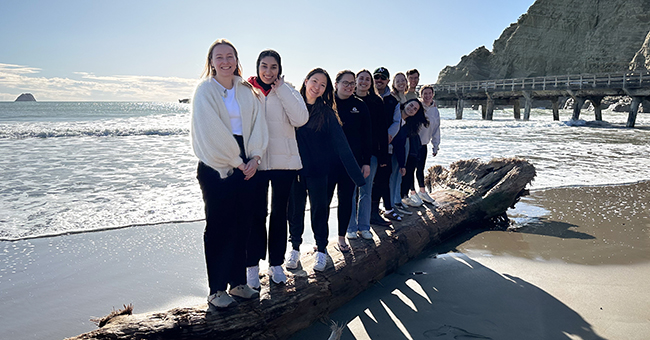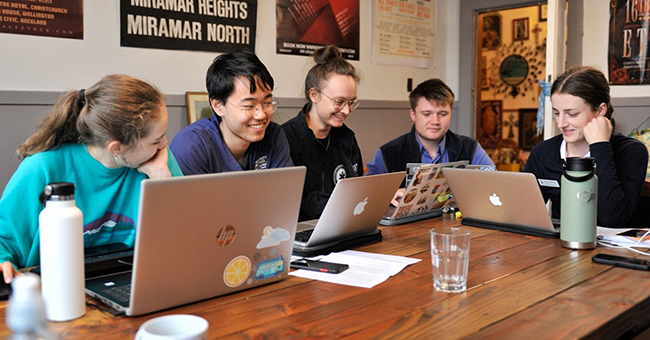The University of Otago offers Interprofessional Education (IPE) opportunities at three levels: exposure, engagement, and immersion throughout our students’ learning journeys, ensuring they are ready for collaborative practice upon graduation.
Read more about the student IPE journey
 Tairāwhiti IPE Programme students from different health backgrounds working together on a community project
Tairāwhiti IPE Programme students from different health backgrounds working together on a community project
The Complex Rural Immersion (CRI) programmes based in Tairāwhiti and Te Tai o Poutini, provide residential block courses that accommodate varying numbers of students and disciplines, offering an immersion experience as part of the Interprofessional Education (IPE) opportunities. Each year, five blocks are offered, with each block lasting five weeks. Student numbers and participating disciplines vary in each block, depending on availability from their schools of origin. Students undertaking longer clinical placements may spend five weeks in the IPE programme and the remainder in their primary discipline’s placement, allowing them to still benefit from the IPE programme. Currently, up to 14 disciplines are involved from a range of institutions including Ara Institute of Canterbury, Auckland University of Technology (AUT), Eastern Institute of Technology, Massey University, Otago Polytechnic, Southern Institute of Technology, University of Auckland, University of Canterbury, University of Otago and Wintec. A local Otago team delivers the programme in Gisborne and Greymouth.
Senior health professional students participating in the CRI programmes spend three days a week on clinical placement in their ‘home’ discipline. They also dedicate half a day to either hosting or shadowing a student from a different discipline. The remaining one and a half days are devoted to IPE programme activities, including case studies, community projects, and team-building activities that highlight the unique aspects of rural NZ. The shared accommodation setup further facilitates engagement and interaction among students from different disciplines.
The CRI programmes are integral to the Otago spiral curriculum of IPE learning, which spans across each year of study. Health New Zealand Te Whatu Ora provides funding for this programme and has identified four key learning pillars for the programme:
- Rural health
- Hauora Māori
- Long-term conditions
- Interprofessional collaborative practice
As outlined by Health New Zealand Te Whatu Ora in their Health Workforce Plan 2023/24, reorganising teams and altering where care is provided can enhance whānau experiences and increase job satisfaction among the health workforce. Interprofessional teams are more resilient and adaptable to the evolving needs of whānau, technology, and service delivery models. Going forward, interprofessional collaboration will be a key feature in the health sector, with an increased expectation for professionals across various disciplines to work together in service delivery teams. This approach aims to maximise the use of skills and resources to better support whānau care and develop new healthcare workforces that meet the diverse needs of our communities.
Otago’s IPE rural immersion programme in Tairāwhiti was launched in 2012 and has been running successfully ever since; the Te Tai o Poutini programme was launched in 2021. While international evidence suggests that maintaining rural programmes can be quite challenging, the CRI programmes offered by University of Otago are a notable exception. Over the years, they have consistently received strong support and engagement from local health service providers, cultural organisations, and the broader community. Graduates of the CRI programmes are now making valuable contributions to the healthcare workforce in Tairāwhiti, Te Tai o Poutini, and other rural areas across New Zealand.

